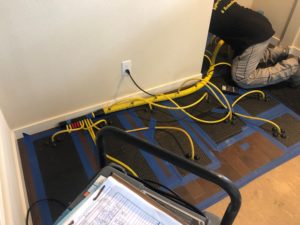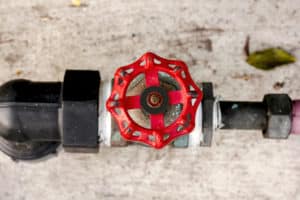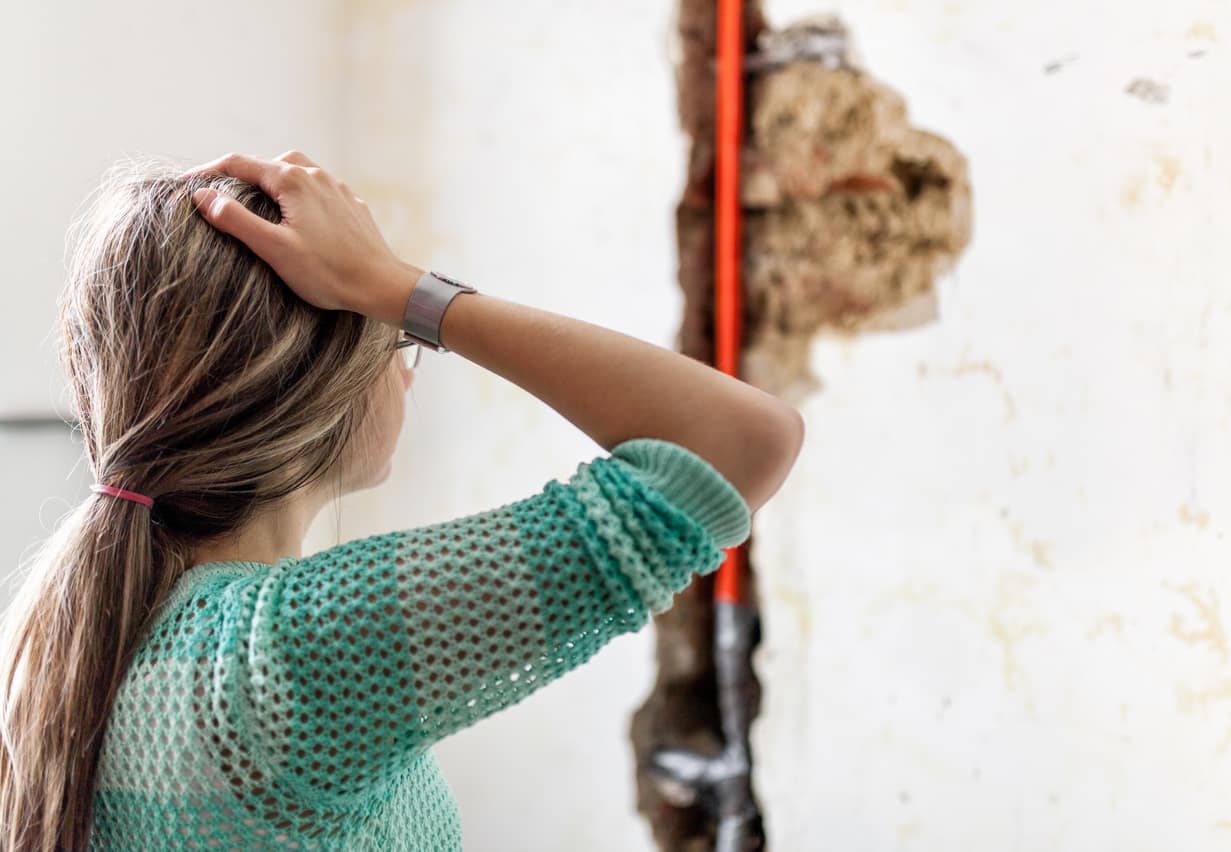You might be surprised to learn that water damage is one of the most common – and costly – homeowners claims. In fact, it’s the homeowners claim we get called about the most in our office.
Nationwide, water damage claims are second only to wind and hail damage. And while you might experience hail or severe winds a few times a year, water damage is a year-round risk.
Our own former team member, Ashley Abrams, experienced a serious water damage claim in 2019. Record-breaking snowfall and cold temps created an ice dam on her roof, leading to water damage in both stories of her home. She shared her experience on our blog.
 Repairs and restoration taking place in Ashley’s home
Repairs and restoration taking place in Ashley’s home
The good news is there are ways to protect yourself against costly water losses and claims. We have nine easy tips to help keep your home safe and well-maintained and to reduce your risk of water damage.
Outside the home
First, let’s talk about the outside of your home. Some regular maintenance of key areas on your property can prevent water from making its way into your home.
1. Disconnect hoses
Disconnecting your hoses from the faucet should be on your fall to-do list. Standing water in a hose can freeze back into the pipe and create an ice block that – in a best case scenario – stops your water flow and, worst case, may bust your pipes and create damage to walls, floor and foundation.
2. Clean gutters and downspouts
Clean your gutters at least twice a year to avoid blockage and ice dams. Standing water can cause damage to your gutters and roof and unmanaged overflow may create puddles that could damage your foundation. Don’t forget to clean any downspouts to ensure water can flow through and secure your downspouts so that they point away from the home.
The City of Everett has great tips on how to prepare your home for fall and winter storms.
Watch this video for handy tips from the City of Everett
3. Maintain trees and vegetation
Thriving shrubs can be a beautiful thing – except when their roots wrap around your pipes and break them. That’s why it’s important to minimize landscaping near utility pipes or, if necessary, remove trees and shrubs that have become too big.
There are many online resources that provide tips on sewer-safe landscaping. The City of Everett maintains a database of trees with recommendations for how far to plant them from underground utilities.
Inside the home
Now that you’ve got a handle on water outside your home, let’s look at how to reduce your risk of water damage from sources inside your home.
4. Know your water main
Plumbing experts say that the water main shutoff may be the most important plumbing feature in the entire house. That’s because your water main supplies water to the entire house. Water enters your home through the water main and is then distributed to other pipes.

Know where your water main shutoff is located
If you experience a plumbing emergency inside your home, knowing where your water main shutoff is located will make it easier to turn off the water right away, and hopefully minimize any damage.
When Nick and Meghan Pembroke needed to replace their water heater a few years ago, their plumber noticed that their house was missing a water main shutoff. After his years of working with clients on their water damage claims, Nick knew how important the water main shutoff was, and had it installed right away.
We also recommend shutting off your water main if you leave your home for an extended period of time. If no water goes into the house, chances are no faucet drips can wreak havoc on your home!
5. Maintain appliances
Appliances are the most common cause of in-home water damage. Check and maintain your appliances regularly for leaks according to manufacturer’s directions.
We recommend paying special attention to the state of your washing machine and refrigerator hoses. When these become old and brittle, they often become leaky as well, and are among most frequent causes of water loss for homeowners. A hose typically has a life expectancy of about five years. Replace yours regularly to avoid a mighty mess and expensive damage.
6. Investigate and fix leaks promptly
If you find evidence of a leak anywhere in your home, investigate it right away. If you opt to ignore moisture damage or postpone making necessary repairs, be prepared to experience mold, mildew, dry rot, or even structural damage to your home.
Keep in mind that homeowner’s insurance provides coverage for damage that is sudden and accidental. Damage that results from lack of maintenance is not covered on a standard homeowners insurance policy.
Our friends at Everett business Alpine Cleaning and Restoration Services share several common signs of water damage on their website. Be on the lookout for mildew smells, damp spots on the floor, the sound of dripping or rushing water, and more.
7. Install water detection devices
A water detector is a small electronic device that sounds an alarm when its sensor is in contact with moisture. Its main benefit is that it detects low moisture levels or slow leaks that often go unnoticed.
There are several types of detectors, including “smart” detectors that can be monitored via an app on your phone. You can find them at hardware stores or purchase them online.
Install them near water heaters, sump pumps, washing machines, dishwashers and toilets to prevent extensive damage and mold growth.
As a bonus, several of our carriers offer discounts on your home insurance if you install water detectors in your home.
8. Check your water pressure
If the water pressure to your home is set too high, pipes and hoses may fail under the pressure. Buy a water pressure gauge at a local hardware store, attach it to an outside faucet, and turn the faucet to full force. The gauge will give you a reading of the home’s water pressure.
Typical residential water systems are designed for water pressure of 40 – 70 psi. If your home’s water pressure exceeds 100 psi, install a pressure regulator (which is available at hardware stores as well.)
9. Monitor your water bill
Sometimes, the only way you know that water is leaking is taking a closer look at your water bill. If your usage jumps significantly from one month to the next without explanation, put your “water detective’s hat” on. Is there a leak in your crawlspace? Or is it a pipe in your front yard? Don’t leave mystery leaks unattended!
You can learn more about homeowners insurance on our website. Give us a call today to make sure your home is adequately protected!

